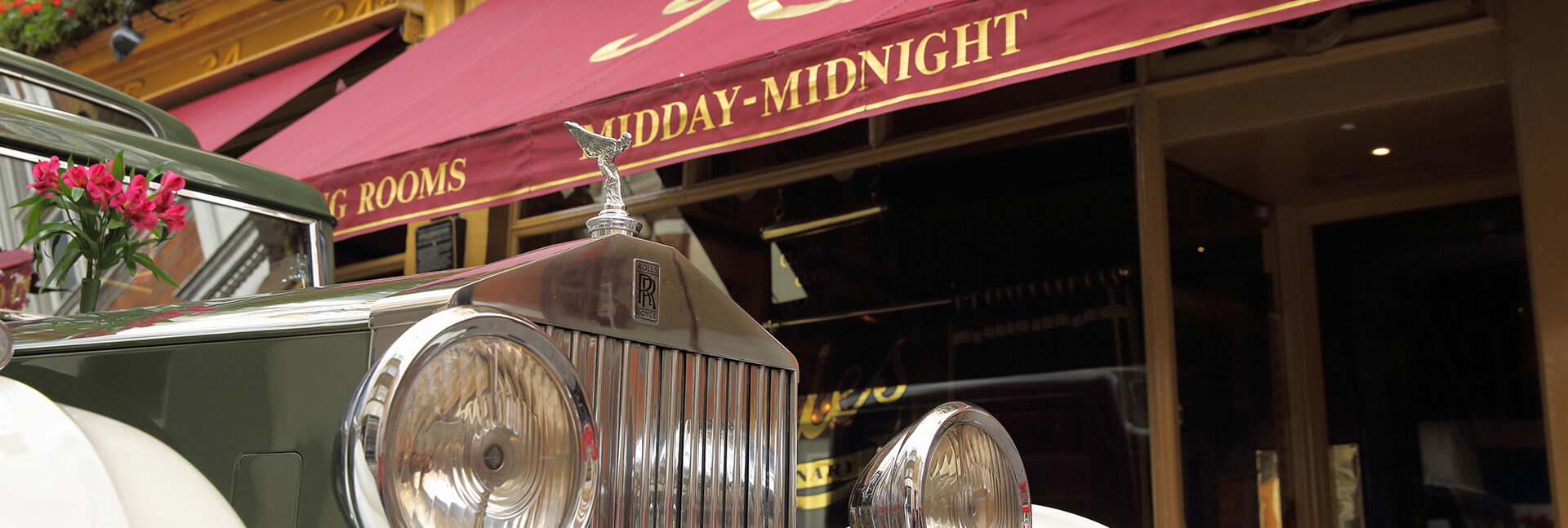All restaurants with history run the risk of becoming its prisoner, more beholden to the past than the present. Rules, the great English game restaurant on London’s Maiden Lane, is more at risk than most, for it has more history than most. It opened in 1798, making it the capital’s oldest establishment. Since then it has had just three owners: the family of its founder Thomas Rule until 1918, the Bell family until 1984 and now businessman John Mayhew, who bought it because he thought ‘London deserved a spectacular English restaurant”.
There are always critics willing to argue that, with its red velvet plush, dark wood panelling and cluttered walls, Rules represents a theme park vision of Victorian England, marketed at American tourists. And yes, a lot of its business does come from overseas. But it has, and always has had, a devoted hardcore British clientele. They come year after year because they know they will find a kind of cooking – solid, unmodish, but deftly executed for all that – that they will find almost nowhere else.
The last Tory cabinet – Michael Hesletine, William Hague, and Ken Clarke in particular – were regular visitors because of the restaurant’s proximity to Whitehall, until they were voted out of office, when they were replaced by the current Labour Cabinet. It has played host to three of the five James Bonds – Roger Moore, Timothy Dalton and Pierce Brosnan – as well as paul Newman, Harrison Ford and Joan Collins.
But all of these names pale against those that history can supply: upstairs is a private dining room named for Charles Dickens, who ate here often. Next to it is the Edward V!! room, because it was where he entertained his mistress Lillie Langtry. (A special curtain was installed so they could slip up the stairs, unseen by the commoners). On the floor above is the Graham Greene Room – the novelist ate there whenever he was in London and featured it in his novel The End of the Affair. And next to that is the newest of the rooms, named after the Poet John Betjeman. In 1971 Betjeman made a passionate speech in defence of Rules at a planning meeting discussing proposals to redevelop the Maiden Lane area of Covent Garden. “A place which has constantly been used by actors, managers and famous people, as Rules has, acquires an invisible atmosphere just as a church frequented by praying people acquires an atmosphere”, he declared. “We can sense it and it will not photograph.” Rules was saved.
I first experienced that atmosphere a quarter of a century ago, when I was 10. My mother, a writer, was in the process of writing a sequence of 12 novels that followed two London families from the eighteenth century to the twentieth, and because Rules was in existence throughout the period a scene in each book was set there. (It has also appeared in the novels of Evelyn Waugh, John Le Carre and Penelope Lively). It was a place for which my mother feels great affection and to which she took us for special treats. I remember still the rich, dense jugged hare i ate then, served from its own shining copper pot; 25 years on, jugged hare is still on the menu although today the marinade consists of Chinese five spices. It is an ingredient which was unlikely to be found in the Rules kitchen of the Seventies.
That is the key to its continuing success. the menu still refers, quaintly, to feathered and furred game, mostly brought down from the restaurant’s own game estate in the High Pennines. Wild duck comes comes both roast and confit, where once such French cooking techniques would not hve been tolerated. Whole roast grouse may still come with game chips and bread sauce but there is game jus rather than over thickened gravy. Venison is there, both roasted and as a carpaccio. Potted shrimps are lighter on the butter.
As Myhew himself puts it: “History’s great but restaurants need to move on and keep re-inventing themselves or they die.” Clearly the formula works: the kitchen brigade of 30 serves 500 meals a day and, each year, gets through 18,000 game birds, more than any other restaurant in Britain.
There are complaints. There are those – including some members of staff – who hate the new laminated menus which, they say quietly, are reminsicent of a Harvester. And when last year, Rules announced they were banning smoking from the general dining room they were flooded with letters of complaint from regulars, some of whom had been coming for half a century. It was, a number declared, a surrender to the caprices of fashion, something which had never before infiltrated the place. perhaps it was. if so it was one of the few victories that fashion can claim at Rules, in 203 years.

